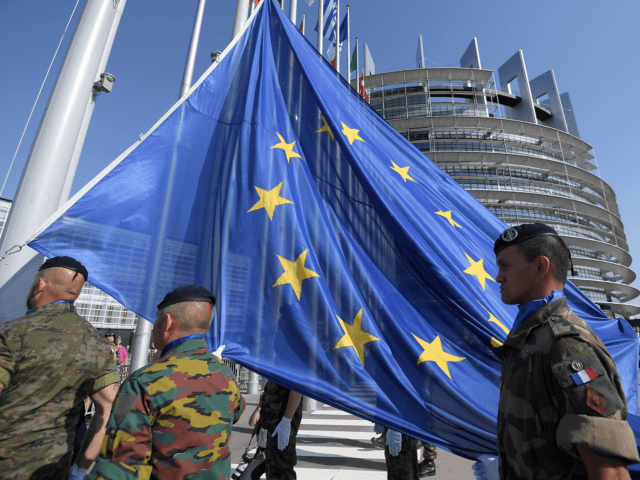The Conference on the Future of Europe has approved measures calling for the establishment of a European Union army and centralising power in the hands of Brussels eurocrats on Saturday.
The Conference, which was established last year to supposedly add more democratic voices to the way the EU operates through the addition of supposed ‘citizens panels’, has been criticised for doing the exact opposite.
In a meeting in Strasbourg, France on Saturday, a plenary session of the Conference on the Future of Europe approved over 300 proposals, including the establishment of a “joint armed forces” of the European Union, as well as the empowering the European Parliament to propose its own legislation — currently EU-level legislation is initiated almost solely by the unelected European Commission — and the elimination of national vetos, which would remove much power from smaller EU member-states.
The globalist co-chairman of the Conference, former Belgian prime minister Guy Verhofstadt MEP, said that the European Parliament will take up the measures next week for consideration in hopes of making them into law as “soon as possible”.
“There is no time to lose. The world of tomorrow is a world of empires,” the europhile said. “It’s a world of danger, we have seen it with Ukraine, and in this world we need to defend ourselves, to organise ourselves to defend the interests of our citizens, and therefore we need to reform the Union.”
Verhofstadt, the European Parliament’s chosen representative in Brexit talks, went on to say that the reforms are “necessary for our survival,” warning that Europe will otherwise “disappear” and come under the control of “autocrats instead of the liberal democracy we have”.
However, others have claimed that the motions put forward by the Conference only serve to undermine the national sovereignty of member-states, in particular conservative nations with less sway in Brussels.
Swedish MEP Charlie Weimers, who has previously likened the Conference to “Communist China or Cuba”, argued that the ‘citizens panels’ were not representative of populations across the bloc and that they were carefully curated by those seeking further expansion of European Union power, despite Brexit and concerns about the erosion of national sovereignty across the bloc.
“While the participants are supposedly randomly selected, they are, by the EU’s own admission, provided with ‘professional support and guidance’, which in great part explains why the panels never recommend that any EU powers be limited or repatriated to the Member States,” Weimers wrote on Friday in the Brussels Times.
The Swedish MEP, who is a member of the European Conservatives and Reformists (ECR) group in the European Parliament, went on to say that “with very few exceptions, identical to the policy objectives and goals already set by EU leaders, especially the federalist Spinelli-Group.”
“If the panels were intended to provide new ideas from grassroots perspectives, they must be said to have failed remarkably – but then of course, that never was the intent. The European federalists have only ever intended to speak and listen to their ever-dwindling cheering crowd, seemingly blissfully unaware of the growing anger on the ground over their disconnect and disrespect of ordinary citizens.”
The formation of a fully-fledged European Union army was dismissed as a “conspiracy theory” by pro-European figures during the Brexit debates, with then-Deputy Prime Minister Nick Clegg accusing Brexit leader Nigel Farage of peddling a “dangerous fantasy” by predicting the bloc would seek to form its own military.
Clegg, who would be given a knighthood and a high-paid gig with Facebook after being voted out of both government and then Parliament by the British people, continued to maintain that a European Army was “fictional” even after EU member-states signed an agreement creating a European Defence Fund and Permanent Structured Cooperation process (PESCO) in November 2017.
A European Union Military Staff had already existed in plain sight since 2001.
Calls for an EU army have only increased since Brexit. In the wake of President Joe Biden’s disastrous withdrawal from Afghanistan, for example, EU Commission President Ursula von der Leyen said that the bloc must build the “political will” to create its own military force.
The President of the European Council, Charles Michel, would later argue that the failure of Afghanistan showed the urgency for the bloc to increase its “strategic autonomy“.
Ironically, while the formation of such a military force would likely be established off the backs of the supposed threat posed by Russia, the EU is currently the single largest financier of the Russian war effort in Ukraine, sending some €44 billion to Moscow in exchange for gas and oil since the invasion was launched in February.
Follow Kurt Zindulka on Twitter here @KurtZindulka


COMMENTS
Please let us know if you're having issues with commenting.